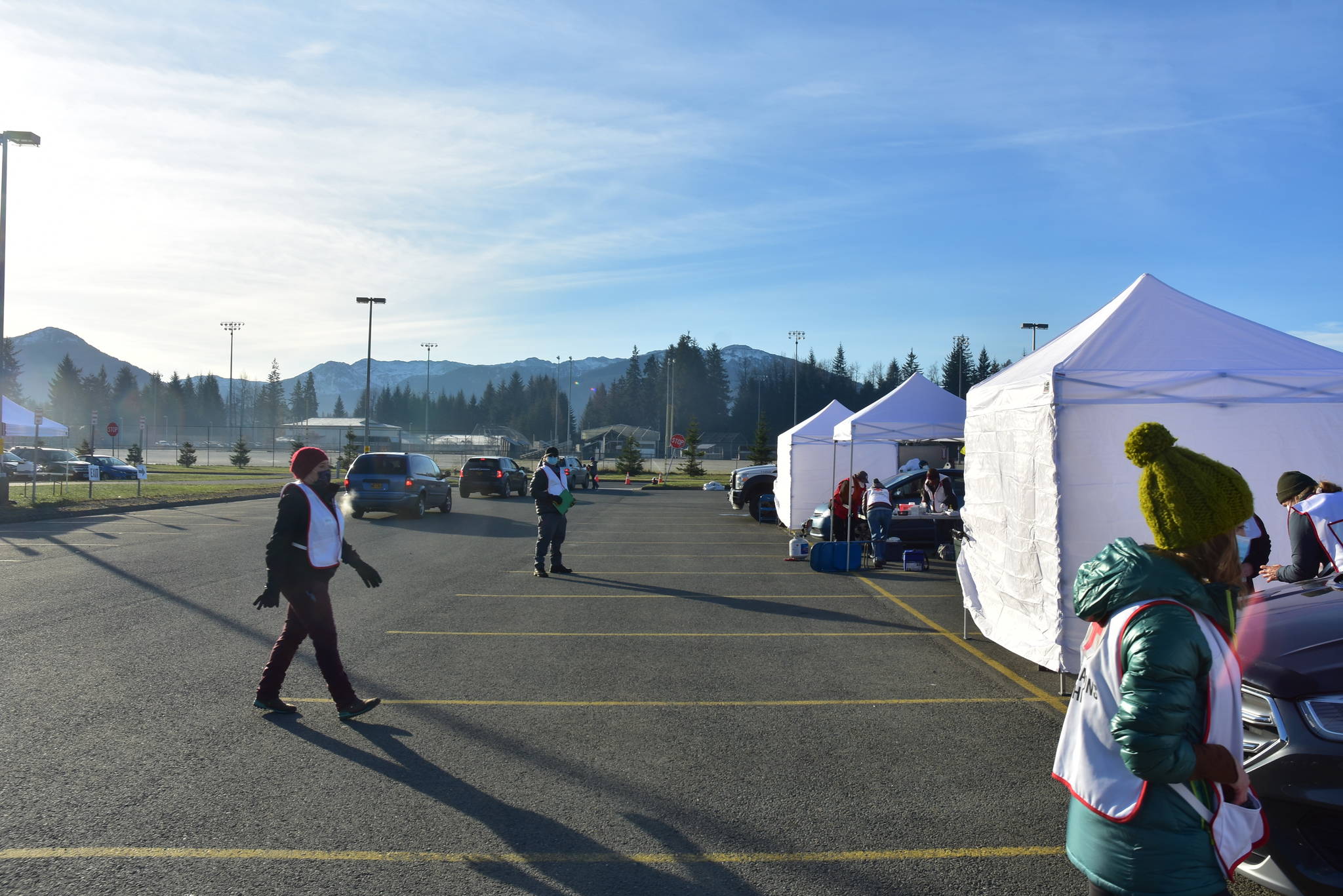City officials hope to make an announcement about Juneau’s health restrictions on Monday based on what Juneau’s case count looks like over the next few days.
For the first time since October, Juneau’s average daily case rate dropped below 10 people per 100,000, bringing the city out of the high alert level established by the state. Thursday, the case rate in Juneau per 100,000 over a 14-day period was 8.71 putting the city in the intermediate alert range under the state’s metrics.
But those numbers can change quickly, said Mila Cosgrove, incident commander for the city’s emergency operations center, and city health officials wanted to wait for more data before changing restrictions, she told the Empire in a phone interview Thursday.
“We’re kind of waiting to see what happens with testing we’re doing this week with the increased testing at the fire training center if we’re going to see a spike for the holidays,” she said.
According to a CBJ website that outlines risk metrics and mitigation strategies, under a moderate risk level, indoor gatherings of up to 50 people with safety measures would be allowed, bars could operate at 50% capacity and stay open past 11 p.m. and gyms could operate at 50% capacity instead of 25% capacity among other changes.
The city recently began asymptomatic testing at the Hagevig Regional Fire Training Center in the Mendenhall Valley.
[City shares testing, vaccination updates]
Depending on what Juneau’s numbers are over the weekend, Cosgrove said she’s hoping to make an announcement about changing restrictions on Monday. But she added that a spike in cases could lead to a reversal of that decision and restrictions being imposed again.
“I’m choosing to be optimistic,” she said of Juneau’s case numbers, “but we don’t want to whipsaw people.”
The city bases its health restrictions on multiple metrics, one of which is the city’s case rate over seven- and 14-day periods but also things like hospital capacity and community spread. Capacity at Bartlett Regional Hospital was doing well, she said, but the city relies on other cities like Anchorage and Seattle for health services and the situation there affects Juneau’s health care capacity.
There is still a fair amount of community spread, Cosgrove said, and contract tracers will still having trouble following-up with positive cases.
During a news conference Thursday, state health officials urged Alaskans to remain vigilant about health mitigation strategies even as numbers are declining and vaccines are being administered.
“Continue to remain vigilant,” state epidemiologist Dr. Joe McLaughlin said. “There’s a light on the horizon now with vaccines, but it’s going to take quite a while before we achieve herd immunity.”
A new, more contagious strain of the coronavirus first discovered in the U.K. has not yet been found in Alaska according to Jayme Parker, health program manager with the Department of Health and Social Services, but has been found in other U.S. states.
A more transmittable disease means a higher level of herd immunity is needed, McLaughlin said. It’s possible in the coming years that several new strains of the coronavirus could develop, and much like with the influenza vaccine, future injections could contain vaccines for multiple strains of the virus. Influenza vaccines, McLaughlin noted, currently contain vaccines for four different strains of the disease.
Vaccines are now available to members of the general public aged 65 and older but there is a limited supply of vaccines in the state, said Dr. Anne Zink, Alaska’s chief medical officer. More shipments are expected and state health officials are committed to getting a vaccine to everyone who wants to receive one, she said.
The city of Juneau is planning a mass vaccination event for Jan. 15-17, but the exact details of that plan are not yet finalized, Cosgrove said. The city held a mass vaccine event in October, but administering a COVID-19 vaccine is a much more complicated process needing a higher level of coordination. Cosgrove said the city was not currently considering a drive-thru clinic like for the flu vaccine, but that doesn’t mean the city won’t use that approach later.
[Chief medical officer: Vaccine reactions should be considered in context]
Because some people have had adverse reactions to the vaccine the city wants to be able to monitor patients for a short time after they receive the injection to ensure there’s no adverse reaction and to administer clinical help if needed. City officials have considered using Centennial Hall as a distribution site, Cosgrove said, but added all plans are still preliminary.
McLaughlin pointed to a recent study that found only 21 cases of anaphylaxis, an allergic reaction most commonly treated with epinephrine, from among nearly 2 million injections given. Juneau had the first documented case of an adverse reaction to the vaccine in the nation when a Bartlett Regional Hospital employee suffered anaphylaxis after receiving the Pfizer vaccine. Despite her own reaction to the vaccine, the health worker still encourages others to get the shot.
The city’s website for registering for the January clinic is not yet operational, Cosgrove said, but once it was, residents 65 and older will be able to apply for eligibility and will receive specific instructions outlining the process.
Cosgrove said she is aware people are eager to see restrictions lifted, but asked the community for more patience as the vaccine is deployed.
“The virus impacts a lot of people at a lot of different levels,” she said. “I’m hopeful to make that announcement, we’re anticipating that at this point, but the numbers are what the numbers are.”
• Contact reporter Peter Segall at psegall@juneauempire.com. Follow him on Twitter at @SegallJnuEmpire.

